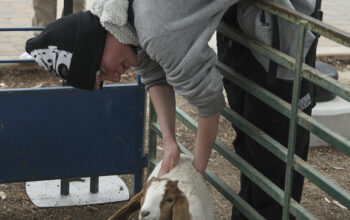Dystopian robot films where bots blend in with humans are no longer a thing of fiction. Bots have now entered academia, posing as students and infiltrating Canvas courses.
A plan of action to eliminate them was one of the issues discussed in Building 600 on March 11 at the Pierce College Academic Senate meeting.
The bot issue began as false enrollments, which was an easier thing to resolve—professors would simply drop the inactive “students.”
Recently, bots have begun to submit assignments, as well. The submissions are mostly unintelligible nonsense but it has made it harder to weed them out, according to Academic Affairs Senator Wendy Bass.
First Vice President Cara Gillis stated the executive committee acknowledged the presence of bots, both locally and at the district level.
Interim President Ara Aguiar congratulated the Theatre and Media Arts departments. Both departments recently received awards presented by the Kennedy Center American College Theater Festival and the Journalism Association of Community Colleges.
Theater professor Shaheen Vaaz added to the announcement.
“We took close to 30 students, but we had overall winners in both directing and projections,” Vaaz said. “Then, a lot of finalists and a ton of runner-ups.”
The first issue addressed was after Articulation Officer Cristina Rodriguez provided an update on the past scores report.
The new goal is to build common core restrictors that will set a standard for courses to fit UC transfer and CalGETC requirements. These parameters include identical pre-requisite courses, required course topics, course numbers and descriptions.
Rodriguez explained that the committee requested an extension but the latest plan is to roll out three separate phases between Fall 2025 and Fall 2027.
A few professors pushed back due to the delay in implementing these standards.
Faculty Senate Secretary Jennifer Moses said she feels the concept proposed—creating an identical baseline—is valid, but not allowing for regional modifications can create issues.
“The idea is to have common course descriptions, content and numbering so students who are much more mobile now can know that an apple is an apple and Psych I is Psych I,” Moses said. “It’s so they can take their classes and not worry so much about ‘Is this flavor of this class the same as this one.’ It sounds like a fantastic idea but then you essentially freeze courses in amber, you can’t change them.”
Moses’ main concern is what will happen if teachers aren’t able to adapt their courses for students according to their changing needs.
Other senators repeated similar views.
One of the last issues covered was a student body concern with overlaps in class time slots along with a tentative solution brought to the faculty’s attention by President Margarita Pillado.
“The proposal then is to form a task force with the department chairs, the counselors etc., to figure out the data and maybe try to diversify our in-person schedule,” Pillado said.
CAOT (Computer Applications and Office Technology) Senator Marcus Anderson proposed a student poll.
“A good thing would be for the school to send out a survey to all students,” Anderson said. “For example, ‘What is your major, what times and what classes are interesting face-to-face and online.’”




